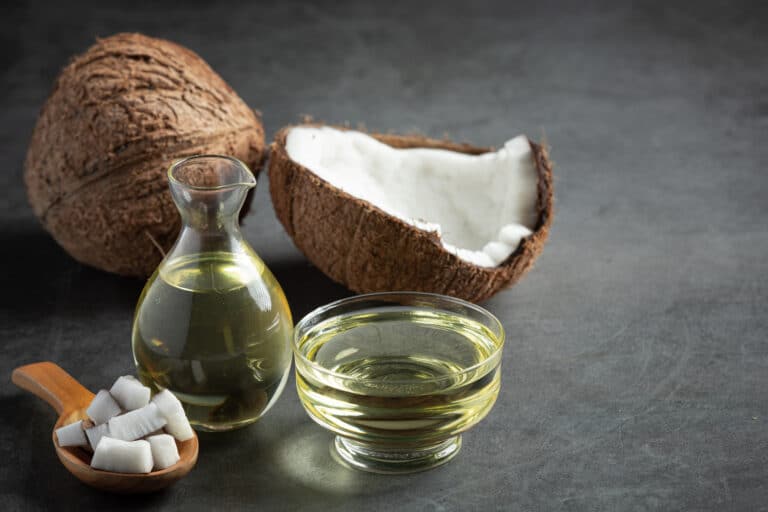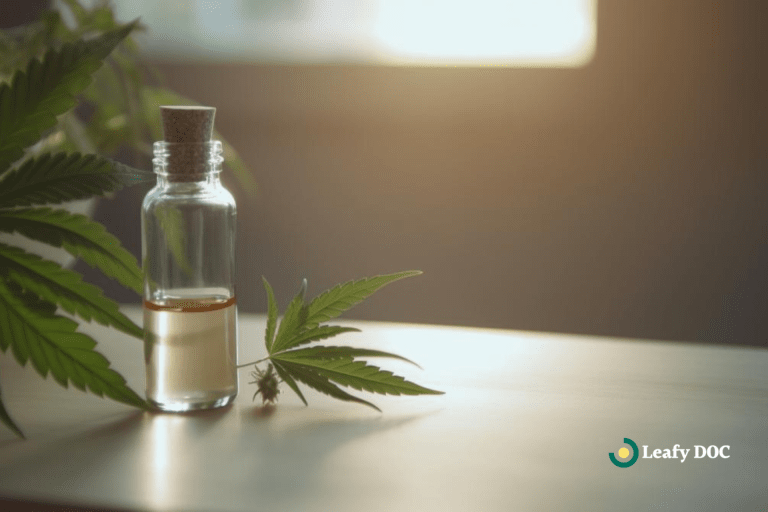CBG: A Promising Treatment for Anxiety
by Haley Mills · January 16, 2023
Are you looking for an alternative treatment for anxiety? Find out how CBG may be the perfect solution.

The marijuana market is seeing various new cannabinoids in different products like gummies, vapes, and tinctures. If you’ve seen CBG products in your local dispensary, you may wonder what it is and how they may work for you.
While we recommend always discussing new cannabis products with your MMJ healthcare provider, we can provide information on this increasingly popular cannabinoid and how it may be able to relieve symptoms of anxiety below.
The Basics of CBG
Cannabigerol (CBG) is a non-psychoactive cannabinoid that is naturally occurring in young cannabis plants. All other cannabinoids are derivatives of cannabigerolic acid (CBGA), which is an acidic form of CBG. Commonly seen acidic cannabinoids include cannabidiol (CBD) and delta-9 tetrahydrocannabinol (THC).
CBG is found in smaller quantities than other cannabinoids, and in most strains, just one percent of CBG can be seen compared to twenty to thirty percent of CBD or THC content. Cannabis products derived from Cannabigerol cannabinoids are hard to come by and are usually very expensive. However, CBG is becoming more popular recently due to its medically researched therapeutic benefits. Research suggests CBG has neuroprotective properties that may even help with motor function.
Potential Medical Benefits of CBG
CBG helps with inflammation, chronic pain, nausea, depression, and anxiety and works to slow the growth of cancer cells. Research has shown it also significantly reduces eye pressure caused by glaucoma and can help patients live a pain-free life. Strains high in CBG can treat medical conditions such as IBS, Crohn’s disease, multiple sclerosis, sleep disorders, muscle relaxation, blood pressure issues, ulcerative colitis, and cancer. Read on below to dive deeper into CBG research and findings.
CBG has shown promising effects on specific inflammatory channels in mice related to the response of chronic inflammation in the bodies. The study concluded that CBG helped to support a normal inflammatory response. Another experimental study from 2013 observed the benefits of CBG on inflammatory bowel disease (IBS). Researchers induced colon inflammation in mice and then gave them CBG, reducing the inflammation and nitric oxide production. Research suggests the anti-inflammatory properties of full-spectrum CBG can also reduce the reactive oxygen species (ROS) in their intestines.
CBG seems to share the appetite-stimulating trait well-known by THC users and produces what is commonly referred to as the munchies. Appetite stimulation can help certain people obtain proper nutrients when they do not want to eat. In a recent study with rats, CBG increased their appetites without producing harmful side effects.
CBG for Anxiety: What does the research say?
Anxiety is the most common mental disorder in the United States, affecting approximately forty million adults nationwide. This number reflects about eighteen percent of our nation’s population.
Anxiety is a relatively treatable condition; however, only around thirty-seven percent of patients seek treatment. Anxiety disorders, including social phobia, stem from inherited traits, brain structures that affect the fear response, life events, and environmental factors.
Medical marijuana for an anxiety disorder typically has a more considerable amount of CBD, and lower levels of THC, depending on the type, can induce anxiety and panic. Safe access to medical marijuana strains with the combination of cannabidiol CBD concentrations could provide health benefits without the risks.
THC and CBD can improve sleep quality and duration in anxiety disorders. Recent clinical trials tell us that medical cannabis may help reduce social anxiety in the short term and help you sleep better. But what about CBG as an anti-anxiety treatment?
CBG may affect dopamine production through the ability to regulate the endocannabinoid system and maintain anandamide in the brain.
Anandamide, one of the endocannabinoids in the body, is associated with feelings of bliss and well-being and floods the brain when we exercise and move our bodies. CBG and CBD prevent enzymes from breaking down anandamide which can affect mood by decreasing dopamine. Dopamine is an essential chemical of the body’s reward system that is released when people engage in certain feel-good behaviors. When we have low dopamine levels, we may experience symptoms of depression, mood swings, difficulty sleeping issues, fatigue, memory issues, and motivation loss. CBG’s ability to preserve anandamide and influence dopamine production may be beneficial for treating depression and anxiety.
Researchers believe that the anti-anxiety benefits of CBG work best when combined with CBD. Due to the entourage effect, many cannabis users experience better results when they consume various cannabinoids rather than one at a time. In a 2021 survey of over 120 patients using primary CBG products, 51 percent used CBG to treat anxiety, and 33 percent used it to treat depression. Based on the survey results, patients were able to reduce stress, depression, chronic pain, and insomnia with CBG. Most users reported positive behavioral and mood impacts, including reduced rates of anxiety and depression. Eighty percent responded that CBG was more effective for depression than other treatment options, and 78 percent said it was more effective as an anxiety treatment.
CBG for Anxiety: FAQs
Here are a few of the most popular questions that cannabis users are asking about CBG.
How is it produced?
CBG is derived from younger plants because they contain the highest amounts of this particular cannabinoid. The levels drop significantly as the cannabis plant gets older. Some specific strains have higher CBG content than others and are specifically cultivated to produce higher quantities than other cannabinoids.
Both CBD and THC begin as CBGA, an acidic form of CBG. In fully developed cannabis plants, you’ll typically find lower concentrations of CBG because most of the CBG is converted to CBD and THC as the plant matures. Due to the difficulty of getting CBG, cultivators are cross-breeding and genetically modifying marijuana plants to help produce most CBG gummies and other products.
What are the effects?
Cannabigerol (CBG) is a cannabinoid. Cannabinoids essentially mimic the body’s endocannabinoid system, such as anandamide. Anandamide is a fatty acid that activates the receptors. Cannabinoids bind themselves to fat-soluble molecules to enter a cell’s lipid bilayer. Cannabinoids attach themselves to CB1 and CB2 receptors.
CB1 receptors are found in the areas of the brain that control pain perception, movement, memory, cognition, emotion, and autonomic functions. CB2 receptors are typically found in immune system cells. When the proper connection between cannabinoid and receptor is made, the body is stimulated to have a specific response.
CBG works by binding to both cannabinoid receptors, where it’s thought to strengthen the function of anandamide. This neurotransmitter enhances pleasure and motivation, regulates appetite and sleep, and alleviates pain. It produces many analgesic properties, but no psychoactive effects so it’s not often used for recreational purposes.Does it get you high?
No, the CBG that occurs naturally in cannabis plants won’t get you high. CBG is a non-psychoactive minor cannabinoid. CBG interacts with the psychoactive compound (THC) to offset its effects, but it does offer many self-reported therapeutic effects for patients such as pain relief.
Are there any risks to using CBG?
There currently isn’t enough research to determine the potential side effects of CBG. However, CBG, like CBD and other minor cannabinoids, has very low toxicity and is well tolerated by our bodies. There have been no adverse effects reported by CBG users but many possible benefits.
Is it legal in the United States?
Per the Federal Controlled Substances Act, CBG sourced from marijuana is federally prohibited if it contains more than 0.3 percent THC content. Still, CBG from hemp plants is legal thanks to the 2018 Farm Bill, which legalized all hemp plant derivatives. As hemp-derived products contain 0.3 percent or less THC, retailers can legally sell them in licensed dispensaries all over the country.
What types of CBG products are out there?
You can get a CBG gummy or vaporizers, topicals, other edibles, tinctures, and concentrates. However, cbg is not as commonly found yet as THC or CBD.
How are CBD and CBG different?
Both CBG and CBD interact differently with the body’s endocannabinoid system. CBG binds with and interacts directly with CB1 and CB2 cannabinoid receptors, while CBD engages with them indirectly. The two cannabinoids have similar effects. Full spectrum CBD oil is generally better for physical ailments such as chronic pain and inflammation, while CBG works better for cerebral issues like stress, anxiety, focus, and attention span.
There is a significant amount of research to support claims of medicinal benefits for CBD; however, CBG studies are still scarce when compared to other cannabinoids. Producing CBD takes less of the cannabis plant when compared to creating the same amount of CBG, lowering the price of CBD products in most areas. You are much more likely to find full spectrum CBD gummies at an affordable price online than taking CBG gummies. Though ,that could change when more research comes out about this promising cannabinoid.
The Takeaway
The production issues of CBG make these expensive cannabinoids scarce within the market, especially when compared to other acidic cannabinoids that are widespread. It’s more challenging to produce than other cannabinoids like THC and CBD. When CBG is cultivated, its derivative products can be costly. CBG has many potential medical benefits, and research is currently being done to streamline its production and availability. CBG appears as but is not a newly discovered cannabinoid; however, it is becoming more mainstream as technology establishes and enhances production methods.
CBG may help with chronic pain conditions like CBD by reducing inflammation and calming the nervous system, which can ease anxiety. More research is needed, but we can be sure to see more CBG for anxiety in the medical cannabis community within the next few years.
Last Updated: August 8, 2024
Get Approved for Your Medical Marijuana Card in Minutes!

Get Your Medical Card
Connect with a licensed physician online in minutes

Like This Article?
Share with your friends
Table of Contents
Keep Reading
-
Your Guide to Making Cannabis-Infused Coconut Oil
Are you looking for a unique way to infuse cannabis into your cooking? Discover the simple and delicious recipe for making cannabis-infused coconut oil!
-
Exploring The Benefits Of Medical Marijuana For Patients’ Access
Unlock the power of medical marijuana to improve patients’ access and transform healthcare. Explore the surprising benefits of medical marijuana now! Click here for a game-changing perspective on healthcare.
-
Managing Sleep Disruption As A Side Effect Of Medical Marijuana
Struggling with sleep disruption from medical marijuana? Find out how to regain a peaceful night’s rest and optimize your cannabis journey. Click here for essential tips and tricks!



